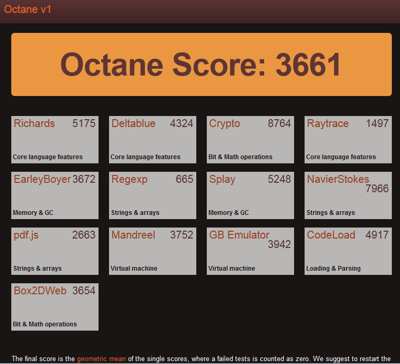| Google's Octane - New JavaScript Benchmark |
| Written by Ian Elliot |
| Wednesday, 22 August 2012 |
|
Google has decided that the existing JavaScript benchmarks just don't do the job of a testing a modern language in a modern web page. The solution is Octane a new benchmark which Google has designed to be more representative of how we use browsers today. Of course we all know what is really wrong with benchmarks... They generally prove whatever point of view the designers of the benchmark happened to hold. What activities you include in a benchmark and how you weight them alters the result and this can be made to show your own favorite in a good light. Even if you accept that a benchmark is fair, its conclusions are only relevant to you and any projects you may be working on if the mix of activities used in the benchmark have some similarity to what you are trying to do.
In the case of Octane the mix is very important. Rather than build special benchmark tasks, Octane uses some real world apps and runs them as a set to obtain an overall performance figure. There are five new tasks added to the original V8 benchmark that Google used to test its JavaScript engine:
You can see that three of the tests are heavily graphic oriented and there are some features from WebGL that stop the benchmark running in IE9 - but it does work in IE10. The original tasks in the V8 benchmark are:
This is a fairly intensive set of tests, but one obvious missing aspect is the interaction of JavaScript with the DOM. If you are writing a program that is going to be dynamically updating the structure of the page then the benchmark isn't going to tell you much.
Octane can be run on a web browser of your choice simply by visiting the web site and clicking Start. It also has a nice user interface and will work on some mobile browsers.
More InformationRelated ArticlesCrockford on JavaScript at Velocity 2011
Comments
or email your comment to: comments@i-programmer.info
To be informed about new articles on I Programmer, install the I Programmer Toolbar, subscribe to the RSS feed, follow us on, Twitter, Facebook, Google+ or Linkedin, or sign up for our weekly newsletter.
|
| Last Updated ( Thursday, 23 August 2012 ) |




